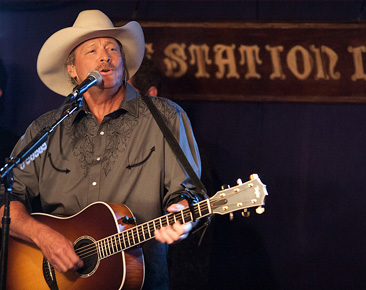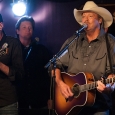
 Some of my earliest memories of listening to music are sitting in the minivan with my mom and sister, singing Little Bitty to the top of our lungs (and yelling “COKE!” when it came to the part about a “six pack of beer and a television set.”) Alan Jackson has long been a favorite in the Mullins household. Never in my wildest dreams would I imagine getting to talk to Alan Jackson, let alone about bluegrass!
Some of my earliest memories of listening to music are sitting in the minivan with my mom and sister, singing Little Bitty to the top of our lungs (and yelling “COKE!” when it came to the part about a “six pack of beer and a television set.”) Alan Jackson has long been a favorite in the Mullins household. Never in my wildest dreams would I imagine getting to talk to Alan Jackson, let alone about bluegrass!
My mom always tells us about how being the wife of a musician/broadcaster, there are very few artists she takes the time to listen to because she is often overwhelmed with how much music is going on around her. However, Alan Jackson is on her small list of exceptions. One of the only concerts my mom has ever talked about going to was an Alan Jackson show in the nineties, and she still tells my sister and I how great it was. I can’t remember a time not seeing her old t-shirt from that show either on her or my sister.
So, when I told my momma that I was going to interview Alan Jackson, she only had one thing to say: “Now, you make sure to tell him that if he’s ever in Ohio and wants some good soup beans and cornbread to stop by the house.” And that’s exactly what I did before Alan and I got started.
DM: So, when did you first start listening to bluegrass music?
AJ: Well, I didn’t even know what I was listening to. I was just a boy, and I wasn’t really listening to music. I didn’t hear much country or bluegrass or any kind of music growing up. Around where I was from there wasn’t a lot of live stuff, and my family really didn’t play. Just church music and singing in church and things.
I guess when I start thinking about it now, the first bluegrass I heard (didn’t know that’s what it was) probably was on TV shows like The Andy Griffith Show with The Darlins, and The Beverly Hillbillies, Flatt & Scruggs being on there, and Hee Haw. My daddy watched that on Saturdays some, and every now and then you’d hear some on there. Those are probably the earliest memories I have of it.
Then when I was a teenager, there was a local band that played some bluegrass stuff. They had an album out called The Bull’s Burrow Bluegrass, and they might’ve gave me a final album of that back in the seventies. That was the first real band, I guess, I knew of like that.
DM: I knew that you’d been listening to bluegrass, particularly recently. I know your song Freight Train, you borrowed that from Blue Moon Rising. Who are some of your biggest bluegrass influences both today and from the past?
AJ: Well, I think as I got a little older and got into country music in the eighties and was getting ready to move to Nashville, that’s when Ricky Skaggs made his way onto country radio. That was some of the first bluegrass on country radio. Most of his stuff was bluegrass songs and bluegrass-influenced. I really loved what he did.
Keith Whitley, of course, started out bluegrass, and I was a big fan of Keith’s and heard some of his stuff as I got a little older. As I got more into music in general—country and everything—I learned to appreciate people like the Louvin Brothers and the Osbornes, Del McCoury, all the guys that came along and were just great writers.
And, of course, Bill Monroe. I liked his writing a lot. He wrote a lot of cool stuff. The one I put on the album is a tribute to him, Blue Moon. Of course, that’s an old standard, but I had sung that at some of my country shows from time to time, especially when I was playing Kentucky.
I’ve always had a love for bluegrass, and I think it’s really closely related to the kind of country music I make and the kind of music I love in country. You know? I’m a Hank Williams fan. His writing and songs, all that kind of blends into country and Gospel and everything that I like.
DM: What do you think is so appealing about bluegrass music?
AJ: Well, I think sometimes it’s even more of a musician’s music. A lot of people play and there’s real singers and harmonies… it’s just real. Most people that like bluegrass really like music, you know? I think it’s not dissimilar to the way country music used to be when it was songs about real life stuff. Melodies that are real and singing and harmonies and playing—all that’s like some of the early country music that I love and like I still try to make on my country side. I think that’s why I like bluegrass, and why so many people do.
DM: You mentioned coming from your traditional country roots. You wrote most of the songs on your upcoming bluegrass album. What was different about the songwriting process when writing with bluegrass in mind rather than your traditional country?
AJ: Well, I don’t think I’m that smart enough about bluegrass to really sit down and analyze it that close, but I just tried to think about all the bluegrass music that I had heard and liked. I knew some of the chord progressions were a little different sometimes than what I normally wrote, and just the feel of them, mainly. I guess that’s just what I tried to do.
The subject matter probably wasn’t that dissimilar than what I’ve always written about in country. It was just a matter of trying to make them sound like real bluegrass, if I could, because this album was just a tribute for me to pay my respects to bluegrass and my appreciation for it.
I don’t really consider myself a great bluegrass signer. I think I’m better suited for country, but I wasn’t trying to switch over and invade the bluegrass world. I was really just showing my appreciation for the music.
DM: Well, I think you did an outstanding job on the record. Each song has its own unique style, and you cover so much material. Some of them are a little bit more traditional-oriented; some are a bit more contemporary; and some even are a little bit more of the rootsy/edgy type of bluegrass that’s been popular these days. It’s terrific! I’m a big fan.
AJ: Oh, well thank you. Thank you so much. I’m glad you like it. Really, to be honest, I just made this album as much for me as anybody. I just wanted to do it and I just thought if it came out where I felt proud of it, I was glad to release it. I hope that the bluegrass fans would find something on there they might like.
DM: So, do you think that your country background helped or hurt you when you were recording The Bluegrass Album?
AJ: I think it helped with my writing. It helped with writing the songs, with my experience of all these years. As far as the singing goes, I don’t really consider myself much of a real, pure bluegrass singer, and I don’t try to be. I just don’t think I could pull it off honestly. I just kind of did it the way I felt comfortable singing it.
I don’t think it hurt me having the country background. I think a lot of country people that like real country singers (like me), like real country music and traditional country music, I think they all probably feel the same way about bluegrass that I do. They feel a closeness to it because it is similar to what we do. There’s a respect for it. I’ve always done music that I liked. I’ve made two Gospel albums because I like southern Gospel music. I’ve been trying to do this bluegrass album for years, so that’s just another one of the list for me.
DM: We talked about all the songs you wrote for this album. Did you write all the songs specifically for this record, or were they part of a process you had been working on the past several years?
AJ: They all came within the last… probably less than a year that I wrote all of those specifically for this record. Now, that one old one I wrote years ago. That one came off one of my country albums back in the early nineties—the Back To Me And You song.
DM: I recognized that one. From the Who I Am album?
AJ: Gosh, I can’t even remember. It was one of the first two or three. Probably. That sounds about right. It’s been a long time.
I thought we’d end up cutting two or three of my old things, but some of the ones we tried, they weren’t as easy to make sound like real bluegrass as I thought they would be, so we didn’t use them all. That one we did and managed to pull it off, I think.







